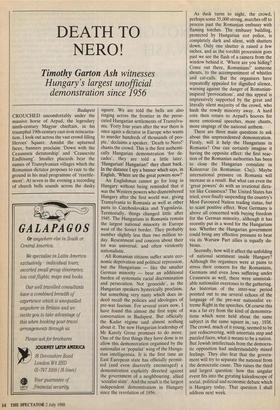DEATH TO NERO!
Timothy Garton Ash witnesses
Hungary's largest unofficial demonstration since 1956
Budapest CROUCHED uncomfortably under the massive horse of Arpad, the legendary ninth-century Magyar chieftain, in his triumphal 19th-century cast-iron reincarna- tion, I look out across the vast crowd filling Heroes' Square. Amidst the upturned faces, banners proclaim 'Down with the Ceausescu dictatorship' and 'Ceauscvitz Endlosung'. Smaller placards bear the names of Transylvanian villages which the Romanian dictator proposes to raze to the ground in his mad programme of 'resettle- ment'. At seven in the evening a recording of church bells sounds across the dusky
square. We are told the bells are also ringing across the frontier in the perse- cuted Hungarian settlements of Transylva- nia. 'Forty four years after the war there is once again a dictator in Europe who wants to murder hundreds of thousands of peo- ple,' declaims a speaker. 'Death to Nero!' chants the crowd. This is the first authenti- cally Hungarian demonstration 'for de- cades', they are told a little later. 'Hungarian! Hungarian!' they chant back. In the distance I spy a banner which says, in English, 'Where are the great powers now?'
An Englishman cannot go for long in Hungary without being reminded that it was the Western powers who dismembered Hungary after the first world war, giving Transylvania to Romania as well as other parts to Czechoslovakia and Yugoslavia. Territorially, things changed little after 1945. The Hungarians in Romania remain the largest national minority in Europe west of the Soviet border. They probably number slightly less than two million to- day. Resentment and concern about their lot was universal, and often virulently nationalistic.
All Romanian citizens suffer acute eco- nomic deprivation and political repression, but the Hungarians — like the smaller German minority — bear an additional burden of systematic racial discrimination and persecution. Not 'genocide', as the Hungarian speakers hysterically proclaim, but something very nasty which does In- deed recall the policies and ideologies of pre-war fascism. For several years now, I have found this almost the first topic of conversation in Budapest. But officially the Kadar regime said almost nothing about it. The new Hungarian leadership of Mr Karoly Grosz promises to do more. One of the first things they have done is to allow this demonstration organised by the nationalist or 'populist' wing of the Hunga- rian intelligentsia. It is the first time an East European state has officially permit- ted (and even discreetly encouraged) a demonstration explicitly directed against the government of a neighbouring, allied 'socialist state'. And the result is the largest independent demonstration in Hungary since the revolution of 1956. As dusk turns to night, the crowd, perhaps some 35,000 strong, marches off to process past the Romanian embassy with flaming torches. The embassy building, protected by Hungarian riot police, is completely dark and silent, with shutters down. Only one shutter is raised a few inches, and as the torchlit procession goes past we see the flash of a camera from the window behind it. 'Where are you hiding? Come out there, Romanians!' someone shouts, to the accompaniment of whistles and cat-calls. But the organisers have repeatedly appealed for dignified silence, warning against the danger of Romanian- inspired 'provocations', and this appeal is impressively supported by the great and literally silent majority of the crowd, who hush the rowdy minority away. A hard core then return to Arpad's hooves for more emotional speeches, more chants, more singings of the national anthem.
There are three main questions to ask about this unprecedented demonstration. Firstly, will it help the Hungarians in Romania? One can certainly imagine it having the opposite effect: the first reac- tion of the Romanian authorities has been to close the Hungarian consulate in Kolozsvar (in Romanian: Cluj). Maybe international pressure on Romania will increase as a result. But what can even the 'great powers' do with an irrational dicta- tor like Ceausescu? The United States has tried, even finally suspending the country's Most Favoured Nation trading status, but to scant positive effect. West Germany is above all concerned with buying freedom for the German minority, although it has recently put in a word for the Hungarians too. Whether the Hungarian government could bring any effective pressure to bear via its Warsaw Pact allies is equally du- bious.
Secondly, how will it affect the unfolding of national sentiment inside Hungary? Although the organisers were at pains to stress their concern for the Romanians, Germans and even Jews suffering under Ceausescu as well, there were unmistak- able nationalist overtones to the gathering. An historian of the inter-war period pointed out to me several echoes of the language of the pre-war nationalist ex- treme Right in the speeches. Of course this was a far cry from the kind of demonstra- tions which were held about the same subject in the same square in, say, 1938. The crowd, much of it young, seemed to be just rediscovering, with uncertain step and puzzled faces, what it means to be a nation. But Jewish intellectuals from the democra- tic opposition had understandably mixed feelings. They also fear that the govern- ment will try to separate the national from the democratic cause. This raises the third and largest question: how this singular event fits into the gyrating kaleidoscope of social, political and economic debate which is Hungary today. That question I shall address next week.














































 Previous page
Previous page